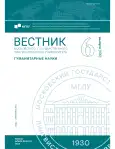“Long” Passive Construction in the Functional Sentence Perspective
- Authors: Nekrasova I.M.1
-
Affiliations:
- Perm State Humanitarian Pedagogical University
- Issue: No 6(900) (2025)
- Pages: 75-82
- Section: Linguistics
- URL: https://journal-vniispk.ru/2542-2197/article/view/301130
- ID: 301130
Cite item
Abstract
The purpose and specificity of the passive construction with a by-phrase is considered in the focus of the topic-comment structure and functions at the level of a super-sentence. The aim of the research: text function analysis of the “long” passive in Russian, English and German, on the basis of text corpus data. The results of the analysis: 1) basic functions of the “long” passive are established; 2) anaphoric means typical of the compared languages are described; 3) a distinction in sentence models of the type Вопрос решен нами (passive) и Нами решен вопрос (semantic role structure) is revealed.
About the authors
Irina Mikhailovna Nekrasova
Perm State Humanitarian Pedagogical University
Author for correspondence.
Email: nekrasova142008@yandex.ru
PhD (Philology), Associate Professor, Acting Head of the Department of Romanic and Germanic Languages and Cross-cultural Communication
Russian FederationReferences
- Nekrasova, I. M. (2016). “Bezagentnye” struktury: passiv i ne tol’ko… = “Agentless” structures: passive and beyond… Perm: University Edition. (In Russ.)
- Lyons, J. (1978). Introduction to theoretical linguistics. Moscow: Progress. (In Russ.)
- Shendels, E. I. (1970). Mnogoznachnost’ i sinonimiya v grammatike = Polysemy and synonymy in grammar. Moscow: Vysshaya Shkola (In Russ.)
- Khrakovskiy, V. S. (1974). Passivnye konstruktsii = Passive constructions. In Tipologiya passivnykh konstruktsiy. Diatezy i zalogi (pp. 24–46). Leningrad: Nauka. (In Russ.)
- Jespersen, O. (1958). The philosophy of grammar. Moscow: Inostrannaya Literatura. (In Russ.)
- Chafe, W. (1975). Meaning and the structure of language. Moscow: Progress. (In Russ.)
- Kurilovych, Y. G. (1946). Ergativnost’ i stadial’nost’ v yazyke = Ergativity and stadiality in language. Izvestiya Akademii nauk USSR, 5, 387–393. (In Russ.)
- Levitskiy, Y. A. (1978). Passiv v sisteme glagolnykh form = Passive in the system of verb forms. Problemy teorii grammaticheskogo zaloga (pp. 226–229). Leningrad: Nauka. (In Russ.)
- Kazantseva, Y. M. (2024). The typological dimension of the category of voice in modern German. Vestnik of Moscow State Linguistic University. Humanities, 7(888), 59–66. (In Russ.)
- Ishmuchametova, A. Z. (2010). Gipersintaksicheskiye funktsii nemetskikh passivnykh konstruktsiy = Hypersyntactic functions of German passive constructions. Izvestiya Samarskogo nauchnogo tsentra RAN, 12/3, 170–175. (In Russ.)
- Zeldovich, G. M. (2010). Sinteticheskyi passiv sovershennogo vida na -s’a: Pochemu yego (pochti) net? = Synthetic passive of perfect aspect with the final -ся: Why doesn’t it (almost) exist? Voprosy yazykoznaniya, 2, 3–36. (In Russ.)
- Levitskiy, Y. A. (2007). Alternativnye grammatiki = Alternate grammars. Perm: University Edition. (In Russ.)
- Arut’unova, N. D. (1972). Predlosheniye i vyskazyvaniye = Sentence and utterance. Obshchee yazykoznanie. Vnutrenn’aya struktura yazyka (pp. 320–328). Moscow: Nauka. (In Russ.)
- Meshchaninov, I. I. (1975). Problemy razvitiya yazyka = Problems of language development. Leningrad: Nauka. (In Russ.)
- Markova, V. A. (2016). Upotrebleniye aktivnykh i passivnykh struktur v razlichnykh vidakh diskursa v svete funktsional’no-pragmaticheskogo podkhoda = The use of active and passive structures in different types of discourse in the light of functional-pragmatic approach. Elektronnyi nauchnyi shurnal, 10-1(13), 206–213. (In Russ.)
Supplementary files










